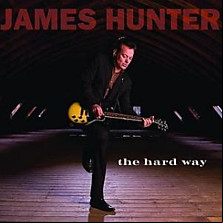BBC Review 1bj6o
More blues, maybe? More twanging rock'n'roll, perchance?
Martin Longley 2008
The title of singer-guitarist James Hunter's second album for the US Concord label refers to his arduous 25-year climb to what might now be deemed 'success', although it's easily possible that that this still-boyish-at-46 Colchester soulster is going to rise even higher. To coincide with this disc's release, Hunter is off on tour with the godlike Willie Nelson, ing him in the UK and, later, Stateside. Another prime career er was Van Morrison, who invited Hunter to his band for most of the 1990s. And now, the pure embodiment of New Orleans songwriting, Allen Toussaint has discovered him, jetting across to London so he could guest on three of these cuts.
It's not clear how long those guest sessions would have taken Toussaint, as the action in Hackney's Toe Rag Studios was very much geared towards a completely live laying-down of all the parts, in real time, as if on stage. that approach? Hunter wouldn't even overdub his vocals, insisting on complete spontaneity and interaction. Ultimately, analogue evangelist producer Liam Watson is justified in this retro technique, as Hunter refines his ultimate re-evaluation of '60s soul, with the sweet-voiced Sam Cooke being a predominant influence. This is not to say that Hunter doesn't possess some burr to his croon: he'll often swing from high muesli trill down to bourbon moan in the space of a single line. Hunter also composes all his own material, even though it's emphatically rooted in the classic soul form.
Those who've followed James since his bluesabilly days as Howlin' Wilf & The Vee-Jays in the 1980s will always miss the Delta harmonica-blowing side of his personality, seemingly never to be regained. Now, though, he's sometimes smooth and poppy, but always spins around to scribble out one of his pointed guitar solos, distinctively lean in their fast attack, wobbly in their whammy-bar licks. Even when his sentiments are low, Hunter usually sounds cheerful. He's got the authentic sound of the times, with signature tambourine/snare clash, doo-woppy backing vocals, sore-throated saxophone and more sonic space than usual, where hangs the occasional vibraphone, or floats the odd string section. He even closes the album with a totally solo voice-and-acoustic-guitar song, which is another first. The only advice Hunter needs to take is that he should change approach slightly for the next album, unless he wants his recordings to start sounding too alike. More blues, maybe? More twanging rock'n'roll, perchance?
